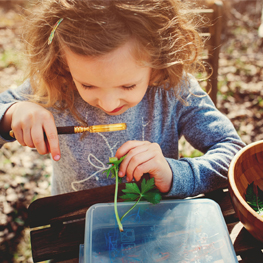
Your three- or four-year-old is done preschool for the year, but isn’t old enough for summer camp. How can you keep the learning and development flowing over the summer so that your child is ready to hit the ground running for preschool or Kindergarten in September?
Summer is a great time to spend some one-on-one time with your child at a slower pace. Take a bit of time to draw up some learning-focused materials that you can easily bring along on your summer adventures:
Judith Sanchez, Owner/Director of the Seedlings Preschools in Calgary, keenly believes learning best follows passion, and so suggests centering your child’s learning around their interests.
If you have a child interested in dinosaurs, for example, use this as a focal topic:
Critical thinking. Allow your child to imagine or critically think prior to guiding the learning (i.e., “What do you think the spiky things are for on the dinosaur’s back?”).
Teach vocabulary. Learning the words ‘carnivore’ and ‘herbivore’ are not much more difficult than learning ‘plant’ or ‘animal eaters.’
Present information in engaging ways. You can pretend to be a dinosaur (goofy voice is a must!) and present your name, how many years ago you lived, and in what part of the world you lived.
Relate the learning to the child’s world. For example, “A T-Rex weighed about nine tons, the equivalent of about nine of Grandma’s cars stacked on top of each other.”
Imagine. Have your child create a song about their favorite dinosaur.
Ask your child to write a letter to the dinosaur telling the dinosaur what they know about it. As the parent, you can write down the majority of the letter, and encourage your child to write one or two words of their own.
Judith also suggests these guidelines for optimal preschooler-age learning: “Younger children learn and respond best to a routine, particularly if the sessions are short and frequent. If the diary happens every night before bedtime, your child will begin to ask for the diary-writing each evening,” she says.
Keep the learning fun and your voice and body language animated.
And the golden rule: Always do less than your child wants. “Stopping when they are still excited and engaged will mean your child’s enthusiasm will continue the next time you pick up the activity,” advises Judith.
Corinna is happiest outside exploring and learning about the world with her three children in tow.
Calgary’s Child Magazine © 2024 Calgary’s Child